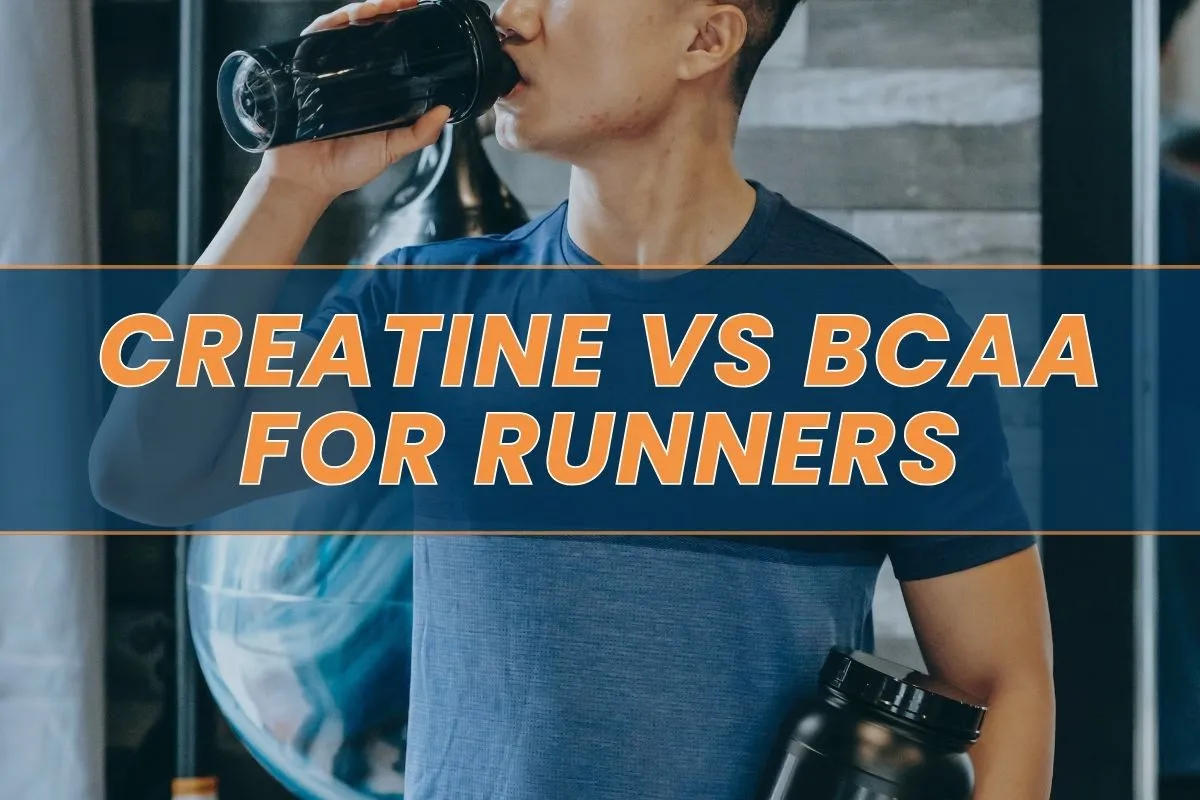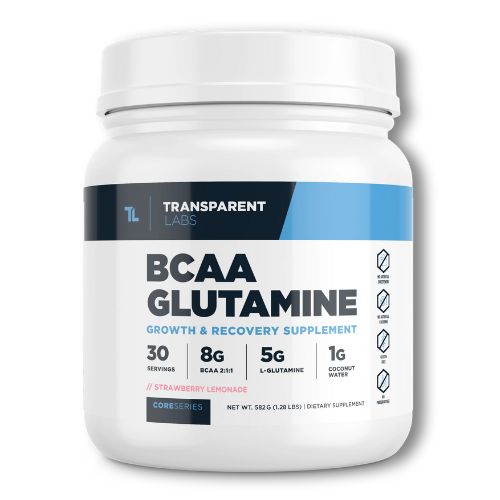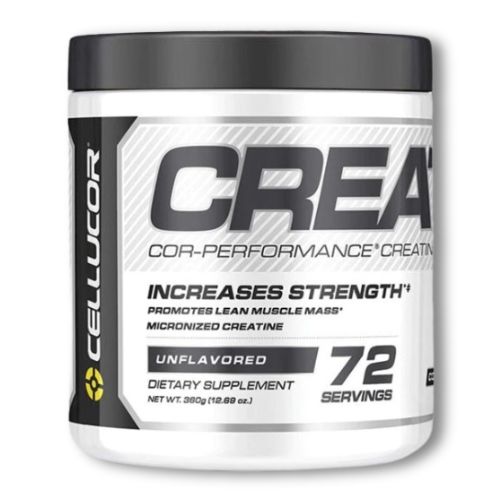Creatine vs BCAAs for Runners – When You Should Take Them and Why
Creatine and BCAAs are two of the most popular and well-researched supplements in the world, with a host of purported benefits that depend on exercise mode and intensity.
Due to this, we’ve looked at creatine vs BCAAs for runners, examining both supplements in detail and their possible influences on running performance.
Creatine vs BCAAs for Runners – The differences between BCAAs vs creatine mainly concern their mechanisms of action. Creatine is well-known for improving high-intensity exercise performance whilst BCAAs may help with recovery and muscle maintenance for running but only when daily protein intake is insufficient.

What are BCAAs?
Amino acids are organic compounds that join together in different sequences to make up the building blocks of protein.
Amino acids can be classified into three groups:
- Non Essential Amino Acids: These can be produced in high enough quantities to meet body needs meaning they don’t need to be supplemented.
- Conditionally Essential Amino Acids: These are made in the body but supplementation may be warranted in certain conditions where the body’s needs can’t be met.
- Essential Amino Acids: These can’t be made in the body meaning you need to get them through dietary intake.
In our body, we have a total of 20 amino acids, with 11 that can be synthesized in adequate amounts. This means that 9 need to be consumed through dietary intake. Any food containing all 9 amino acids is regarded as a complete protein.
BCAAs make up 3 of the 9 essential amino acids. They are known as branched chain amino acids due to their chemical structure which gives them a branched-like appearance. The three BCAAs are
- L-leucine
- L-isoleucine
- L-valine
The importance of BCAAs stems from their role in muscle tissue and as a fuel during workouts. It’s well known that BCAAs make up approximately 35% of the essential amino acids in mammals.
They are metabolized directly in muscle tissue which is why they are seen as an important fuel source for muscle growth and recovery. The role of BCAAs as an energy source is thought to be around 3-18% which may increase depending on the duration and intensity of the workout.
Alongside muscular roles, BCAAs have been proposed to help lower your rating of perceived exertion (RPE) during high-intensity exercise and have a role in glucose metabolism when combined with other essential amino acids. Note the role in glucose metabolism is more of a hypothesis without clear proof currently. But do these purported beneficial effects actually translate into meaningful differences?
In reality, we need approximately 9-12 grams of BCAAs to hit our daily intake targets. This can easily be accomplished through two servings of meat, fish, or even a large portion of peanuts. Whilst vegetarians and vegans are much more likely to be deficient due to the lack of meat intake, focus should be placed on dietary protein intake rather than BCAA supplementation.
3 Benefits of BCAAs for Runners
On top of the well-documented benefits on general health and performance, these are the possible benefits that taking BCAAs may have on running performance in certain situations:
1. Improved Muscle Growth and Recovery in Certain Populations
BCAAs have been shown to contribute approximately 3-18% as an energy source depending on the duration and intensity of exercise. The role of BCAAs in muscle growth and recovery is well known, but the benefits to runners will depend solely their habitual dietary intake.

Pro Tip:
If you are a vegan or vegetarian runner and struggle to hit your daily protein intake targets from whole foods or whey/ plant-based protein powders, using a BCAA supplement may provide the benefits stated above.

Pro Tip:
If you are a vegan or vegetarian runner and struggle to hit your daily protein intake targets from whole foods or whey/ plant-based protein powders, using a BCAA supplement may provide the benefits stated above.
2. Decreased DOMS Following Exercise
BCAAs seem to have the most promising research regarding muscle recovery and reducing DOMS following high-intensity, long-duration exercise which may be performed by some runners. This may also be the case during periods of intense dieting where dietary protein intake may be inadequate.
Supplementing with BCAAs in these situations may help to improve recovery time.
3. Convenient During Ultra Long Distance Running
Whatever your normal dietary intake, the ingestion of BCAAs as a drink is extremely convenient in long-distance events where you can’t consume enough protein or want to limit the amount of possible GI distress from protein shakes or foods between events.
What is Creatine?
Creatine is an amino acid derivative produced by arginine, glycine, and methionine in the body and sourced from certain foods such as red meat, fish, and eggs. If you’re wondering is creatine a BCAA the answer would be no. They are in fact very different.
In the body, creatine is converted into phosphocreatine which is used as a primary energy source by regenerating ATP in muscle cells. Due to this, creatine plays a major role in energy production and therefore athletic performance.
When there is a high demand for ATP, our body uses the phosphocreatine stored in skeletal muscle for resynthesis. This primarily occurs during high-intensity exercise where the need for ATP resynthesis is greater.
At any given time, our creatine stores are approximately 75% full, meaning supplementation provides a way to fill them up which is known as saturation. Saturating the muscle stores fully appears to delay fatigue during high-intensity exercise, leading to performance improvements. Other documented benefits include better recovery and injury prevention.
Creatine is naturally produced in the body, with the liver and kidneys producing around 1-2 grams per day. However, our natural production and dietary intake often aren’t enough to fully saturate our muscle stores which makes supplementation warranted. To hit the daily recommended creatine dosage of 3 to 5 grams, you would need to eat approximately 2 to 3 pounds of meat per day!
2 Benefits of Creatine for Runners
1. Improved Fatigue Resistance and Performance
Whilst running typically involves steady-state exercise over a long duration, it isnt without periods of maximal effort or training blocks focusing on muscle growth and strength. At the start of a race or during a sprint finish, maximal efforts may be required which then relies more on muscular strength and power, both of which creatine has been well-documented to improve.
Periods of training involving a focus on resistance-based training and power can also benefit from creatine supplementation as a runner. Whatever the sporting event is, the wide-ranging beneficial effects of creatine make it a must-use supplement.
2. Improved Recovery and DOMS Prevention
Taking a creatine supplement to fully saturate the phosphocreatine stores in our muscles is well-documented to reduce exercise-induced muscle damage and improve recovery following exercise.
3. Improved Cognition and Neurological Disease Prevention
Regardless of exercise duration and intensity, as a runner you should still be concerned about your cognitive performance and health, especially as you get older. Taking creatine daily may help to improve markers of cognitive function, especially short-term memory in healthy individuals and have possible beneficial effects on neurological disease prevention.

BCAAs vs Creatine
When deciding between creatine or amino acids for running performance, these are the main similarities and differences to consider.
| BCAAs | Creatine | |
|---|---|---|
| Body Production | Essential amino acids (not produced in the body so needed in the diet) | Produced naturally by the body in small amounts |
| Dietary Sources | Meat, Fish, Eggs, Dairy, Tofu, Legumes, Nuts, Seeds | Meat, Fish, Eggs, Dairy |
| Mechanisms of Action | Seen as an important fuel source Involved in muscle growth and recovery Involved in energy metabolism | Increases the amount of phosphocreatine in the body which helps regenerate ATP. This translates into reduced fatigue and improved exercise performance. |
| Purported Benefits | 1. Muscle fuel for growth and recovery 2. Improved body composition (Only by stimulation protein synthesis) | 1. Improved fatigue resistance and exercise performance 2. Better recovery 3. Improved Cognition 4. Prevention against certain neurological diseases (This is still highly speculative and needs more research) |
| Scientific Efficacy | Mixed evidence backing for use when dietary protein intake is adequate Applications may be limited to vegan/ vegetarian runners and/ or those who can’t get adequate dietary intake | Large amount of scientific evidence linking long-term creatine intake to a host of physical and mental benefits which are listed above |
1. Production
BCAAs are essential amino acids which means they need to be consumed via the diet to meet the bodies needs. However, this is commonly achieved via normal dietary intake of good protein sources. Creatine is produced naturally in the body by the liver and kidneys but not in big enough quantities to fully saturate the body’s phosphocreatine stores. Consuming enough creatine via dietary intake is difficult and not really feasible.

2. Dietary Sources
BCAAs are found mainly in meat and fish such as chicken, beef, turkey, and salmon. They are also found in eggs, dairy, tofu, legumes, nuts, and seeds which gives you a wide range of dietary intake options if needed.
Creatine is found in beef, chicken, salmon, tuna, seeds, nuts, and some beans. However, saturating muscle phosphocreatine stores via dietary intake isn’t possible in most cases which is why supplementation is advised.
3. Mechanisms of Action
BCAAs are metabolized directly in skeletal muscle and play roles in cellular homeostasis and muscle protein synthesis. Creatine increases the amount of phosphocreatine in the muscles which helps to regenerate ATP, used as an important energy source.
Subscribe to Our Running Newsletter!
Get free running tips from renowned professional athletes and discounts from top-notch brands.
4. Purported Benefits
The benefits of BCAAs relate mainly to muscle fuel for growth and recovery and improved body composition via their roles in muscle protein synthesis. However, the benefits seem to be isolated to certain populations that have been discussed above.
The benefits of creatine are much more wide-ranging, with proven benefits of supplementation on fatigue resistance, exercise performance, recovery, cognition, and the prevention of certain neurological diseases such as Parkinson’s.
5. Scientific Efficacy
BCAAs are regarded as having mixed evidence when it comes to scientific research. As we’ve explained above, this means that the benefits seem to be isolated to specific situations outside of consuming a normal diet.
Creatine has strong evidence backing in terms of scientific research being one of the most well-researched ergogenic aids in the world. A large body of evidence shows a wide range of health and performance benefits with long-term supplementation.
BCAAs vs Creatine for Runners: Summary
Whilst BCAAs and creatine seem like similar supplements, they are in fact very different. BCAAs play a role in muscle growth and recovery but in most situations, they aren’t needed with an adequate dietary intake. Creatine increases the amount of phosphocreatine in the muscles which helps with ATP regeneration. The benefits of creatine are wide-ranging, with several health and performance benefits that make supplementation warranted.

Pro Tip:
When considering both supplements for running performance, Creatine is by far the better choice. BCAAs can help but only in specific situations which have been discussed above. Both may also be taken together if needed.

Pro Tip:
When considering both supplements for running performance, Creatine is by far the better choice. BCAAs can help but only in specific situations which have been discussed above. Both may also be taken together if needed.
Pros/ Cons of BCAAs
Pros:
- May be useful for vegan/ vegetarian runners
- May be useful when dietary protein intake isn’t adequate and/or a whey protein supplement can’t be consumed
- Available in a wide variety of good-tasting flavors
- Easy to consume as a drink
- Relatively inexpensive
Cons:
- Not needed when dietary protein intake is adequate
Pros/ Cons of Creatine
Pros:
- Large amount of proven benefits including fatigue reduction, exercise performance, injury prevention, and cognition
- One of the most researched ergogenic aids in the world
- Hard to get naturally through the diet which makes supplementation beneficial
- Very affordable and easy to consume
Cons:
- May cause stomach issues in some individuals, especially with a loading phase
- May cause unwanted water retention for weight-based sports
BCAAs vs Creatine: Usage Recommendations
We’ve discussed when to take BCAAs and creatine and how much to take of each of them for running performance or general usage below.
For running performance, BCAAs play a leading role in muscle growth and fatigue reduction but the main question relates to whether they are needed or not.
With the majority of running athletes likely getting enough protein from dietary intake alone, supplementing with BCAAs won’t provide any added benefits.
However, vegan and vegetarian running athletes and those who can’t consume enough protein from their diet may benefit from a BCAA supplement.
In terms of timing around running performance, it doesn’t matter when you take BCAAs. More importance should be placed on consistent daily intake when supplementation is warranted.
Creatine has a wide range of well-documented beneficial effects that include fatigue reduction and better recovery. Even with most of the effects relating to high-intensity exercise, the beneficial effects of creatine are much more wide-ranging than BCAAs which makes supplementation warranted for general health.
Alongside this, fully saturating the body’s creatine stores through dietary intake is very difficult in most cases, meaning supplementation should be considered regardless of your main exercise or sporting activities.
Like BCAAs, the timing of creatine supplementation doesn’t matter. The effects of supplementation are accumulative meaning that the body stores progressively build up with ingestion after which a maintenance dose is needed.
Two dosage methods can be used with the end outcome being the same. The best method depends on individual preference.
1. Loading phase + Maintenance
- Take 20 grams for 5 days split into 4x 5 gram doses
- Take 3-5 grams daily following the end of the 5-day period
2. Maintenance Dosage
- Take 3-5 grams daily starting from the beginning of the supplementation period
In both cases, muscle creatine stores become fully saturated. Adding the loading phase simply does this in a faster time. Bare in mind that the loading phase may cause GI distress in some individuals.
Our Recommended BCAAs – Transparent Labs BCAA Glutamine
Transparent Labs BCAA Glutamine
Transparent Labs BCAA Glutamine powder contains a 2:1:1 mix of fermented vegan BCAAs consisting of L-leucine, L-isoleucine, and L-valine which gives you 8 grams in each 19.6-gram serving. On top of this, they have included 5 grams of L-glutamine and coconut water powder to provide a well-balanced growth and recovery supplement.
In terms of product formulation, each serving contains no artificial flavors, sweeteners, or preservatives. Each tub is manufactured using non-GMO, gluten-free ingredients to give you a high-quality source of BCAAs. Four flavors are available to choose from, with servings in each tub.
Our Recommended Creatine – Cellucor COR Performance Creatine
Cellucor COR Performance Creatine
The COR Performance Creatine contains 5 grams of micronized creatine monohydrate per serving which is at the top end of the clinically recommended daily amount for lean muscle growth and performance support. Each serving contains zero calories, zero sugar, and is gluten-free, making it an ultra-clean, easily digestible source of creatine.
Each unflavoured tub contains 72 servings and comes at an excellent budget-friendly price point. It’s our recommended creatine product for daily use.
FAQs
Will BCAAs make my muscles bigger?
BCAAs may help to build muscle and enhance muscle recovery depending on your normal dietary intake. With daily protein intake sufficient, the use of BCAAs isn’t needed. Compared to whey protein, BCAAs don’t provide any added benefits. Overall protein intake is the most important factor.
Are BCAAs and Creatine the same?
BCAAs and creatine are not the same. BCAAs are composed of three essential amino acids which are referred to as branched due to their chemical structure. Creatine is naturally produced in the body and is made up of three different amino acids.
Are BCAAs good for runners?
BCAAs are essential amino acids involved in energy production during exercise. Alongside this, several studies have suggested that the ingestion of BCAAs may improve exercise performance.
When it comes down to it, the ingestion of BCAAs isn’t needed when total daily protein intake is sufficient. Focus on whey protein intake and use BCAAs in situations where daily protein intake can’t be reached.
Is creatine recommended for runners?
Supplementing with creatine increases the amount of phosphocreatine available for the ATP-PC system that’s primarily used in high-intensity exercise.
Whilst creatine may not help with endurance performance during steady-state, long-distance events, supplementation may help with training performance and recovery.
Creatine may indirectly help with running due to improved strength and conditioning with daily intake that could translate into better running performance.
Should I take BCAAs or creatine or both?
Creatine mainly helps with performance during high-intensity workouts and sports whilst BCAAs may help with muscle recovery and growth when overall daily protein intake is inadequate.
So, can you take BCAAs and creatine together? Creatine should be taken daily to help improve high-intensity exercise performance which may then translate into improved running performance. Creatine also has a host of other proven benefits for the body. Take BCAAs if your daily protein intake is insufficient and a whey protein supplement isn’t available. Both can be taken together with no issues.

Do BCAAs have creatine in them?
BCAAs are made up of three branched amino acids which as L-leucine, L-isoleucine, and L-valine. Creatine is an amino acid derivative made from arginine, glycine, and methionine meaning that no, BCAAs do not have creatine in them.
Conclusion
In terms of general use, creatine would be the recommended supplement due to its proven benefits on performance and recovery. When protein intake is sufficient, the intake of BCAAs isn’t warranted.
For running performance, creatine should be considered due to the possible indirect effects alongside a host of other benefits on the body. It’s one of the most widely researched supplements in the world with proven benefits. BCAAs for runners most likely aren’t needed but may be useful during running situations where adequate protein can’t be consumed for muscle recovery.
Are you a runner? What do you think of creatine vs BCAAs? Tell us about your experiences below!
References:
- Michael Neinast, Danielle Murashige, Zoltan Arany, “Branched Chain Amino Acids,” Annual Review in Physiology 81 (2019):139-164. doi:10.1146/annurev-physiol-020518-114455
- Starkie Sowers, “A Primer on Branched Chain Amino Acids,” Available at: https://www.huhs.edu/literature/BCAA.pdf (accessed December 31, 2023)
- Gina Falavigna, Jonas Alves de Araújo, Marcelo M. Rogero, Ivanir S. de Oliveira Pires, Rogerio G. Pedrosa, Eivor Martins, Inar A. de Castro, Julio Tirapegui, . “Effects of diets supplemented with branched-chain amino acids on the performance and fatigue mechanisms of rats submitted to prolonged physical exercise,” Nutrients 4, no.11 (2012):1767-1780. doi:10.3390/nu4111767
- Zachary Bloomgarden, “Diabetes and branched-chain amino acids: What is the link?,” Journal of Diabetes 10, no.5 (2018):350-352. doi:10.1111/1753-0407.12645
- Alex Hoffmann, “BCAAs for Women: What You Need to Know” Available at: https://blog.lionel.edu/bcaas-for-women?hs_amp=true Accessed December 31, 2023.
- Alexandre Fouré, David Bendahan, “Is Branched-Chain Amino Acids Supplementation an Efficient Nutritional Strategy to Alleviate Skeletal Muscle Damage? A Systematic Review,” Nutrients 9, no.10. (2017):1047. doi:10.3390/nu9101047
- Thomas W. Buford, Richard B. Kreider, Jeffrey R. Stout, Mike Greenwood, Bill Campbell, Marie Spano, Tim Ziegenfuss, Hector Lopez, Jamie Landis, Jose Antonio, “International Society of Sports Nutrition position Stand: Creatine Supplementation and Exercise,” Journal of the International Society of Sports Nutrition 4, no.6 (2007) doi:10.1186/1550-2783-4-6
- Robert R. Kreider R, “Creatine: State of the Science at the Millennium,” Performance Nutrition Buyers Guide (2000) https://www.creightonprep.creighton.edu/uploaded/Athletics_Page/Weight_Room/Supplement_Info/creatine.pdf
- Richard B. Kreider, Douglas S. Kalman, Jose Antonio, Tim N. Ziegenfuss, Robert Wildman, Rick Collins, Darren G. Candow, Susan M. Kleiner, Anthony L. Almada, Hector L. Lopez, “International Society of Sports Nutrition position Stand: safety and efficacy of creatine supplementation in exercise, sport, and medicine,” Journal of the Internation Society of Sports Nutrition 14. No.18 (2017) doi:10.1186/s12970-017-0173-z
- Konstantinos I. Avgerinos, Nikolaos Spyrou, Konstantinos I. Bougioukas, Dimitrios Kapogiannis, “Effects of creatine supplementation on cognitive function of healthy individuals: A systematic review of randomized controlled trials,” Experimental Gerontology 108 (2018):166-173. doi:10.1016/j.exger.2018.04.013
- Kurtis Frank, Katherine Nguyen, “Branched-chain Amino Acids,” Examine.com Available at: https://examine.com/supplements/branched-chain-amino-acids/ (Accessed December 31, 2023)
- Alireza Naderi, Erick P. de Oliveira, Tim N. Ziegenfuss, Mark T. Willems, “Timing, Optimal Dose and Intake Duration of Dietary Supplements with Evidence-Based Use in Sports Nutrition,” Journal of Exercise, Nutrition, and Biochemistry 20, no.4 (2016):1-12. doi:10.20463/jenb.2016.0031
- Photo from Pexels by: Andres Ayrton, Ketut Subiyanto, Karolina Grabowska. Photo from Freepik by: drobotdean, gpointstudio.
If you have any questions or suggestions, you can contact us via email – [email protected]








